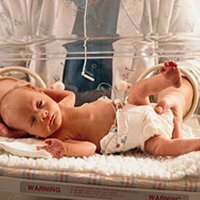Catamnesis of premature infants

In addition to the constantly increased perinatal mortality of premature infants, statistics indicate a high likelihood of development of various disorders in them. Basically, these are neurological disorders and chronic diseases in the distant period. Children who were born much earlier than the term and were observed until adolescence suffered memory impairment, sleep disorders, attention deficit disorder, and had severe behavioral disorders.
Children with extreme body weight
A catamnesis of children born with a weight of up to 1 kg was studied. The study involved 66 children aged 10 months to 14 years. Of this group, eight children at birth weighed less than 900 grams, forty-eight from 900 grams to 1,000 grams, and only ten children had a weight of 1 kg. Some children( 20 in total) were examined by specialists between the ages of ten months to a year, 34 children from one to two years, 19 children were examined from two to three years old and seven children aged from three to fourteen. Some children have been observed many times.
The results of the study were as follows: in 18 children( 27%), various severe CNS lesions were detected, as well as congenital visual and hearing defects. Six children had obvious lesions in the central nervous system - infantile cerebral palsy and a sharp delay in general mental development. All these six children had a complicated intrauterine history, after they were born, they still had a hard time for a long time. Diagnosis of the defeat of the central nervous system, four of the children doctors put in the first three months of life.
Six children from the control group suffered from visual impairment. Three of them were irreversible and complete loss of sight. One girl had pronounced myopia, the other two children had nystagmus. At the same time, a boy with a nystagmus had a hereditary burden: his older sister also had this defect. Six children suffered from hearing damage - from simple reduction to absolute deafness. Their mental development with regard to hearing loss was normal. In general, the number of premature babies with severe CNS lesions and congenital visual impairment was 18%.This figure for children with extreme body weight at birth is considered low.
The remaining 48 children( 72%) at the time of the examinations did not find any gross deviations in their psychomotor and physical development. The absolute majority of them developed in the first year of life in accordance with their prematurity, and by the age of three in intelligence, these children were almost no different from their full-term peers. If we talk about the general motor and mental development of children born with a weight of up to 1 kg, then it should be noted that in the first year of life most of them are often sick, these children suffer from a decreased appetite, and their body mass index is still long behindMore full-time peers.
General features of preterm infants
1. Premature infants are more likely to have organic congenital CNS lesions. They are caused by pathology during the prenatal period or by passing complications during childbirth, not related to the very prematurity;
2. Recently, premature babies with a weight of up to 2 kg. More often suffer from congenital infantile cerebral palsy. But this is also characteristic of absolutely full-grown children. Such a trend can be explained by the following reasons: first, there are more opportunities today to save a pregnancy that is taking place with the threat of interruption, and secondly, the progress in the organization of first aid to newborns and the work of resuscitation services in maternity hospitals increase the survival of children with asphyxia or intracranial birth trauma.
3. For preterm infants, the percentage of loss of vision is always high. And such a pathology, as congenital myopia, is caused by very premature. Since light forms of congenital infantile cerebral palsy can not be detected immediately, and some pathologies of the eyesight of pediatricians are not diagnosed at all, then after discharge from the maternity hospital, children with a history of heaviness and weight of up to 1500 grams. Should be constantly observed by a neuropathologist and undergo a full examination with an oculist.



